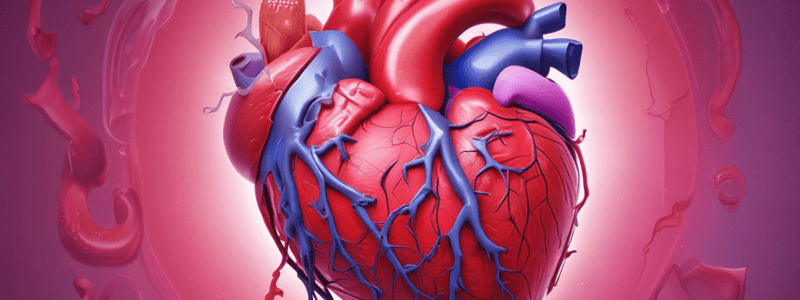Podcast
Questions and Answers
What are common symptoms of heart failure?
What are common symptoms of heart failure?
Which factor can increase the risk of developing heart failure?
Which factor can increase the risk of developing heart failure?
How can heart failure be prevented?
How can heart failure be prevented?
What may a healthcare provider do if heart failure is suspected?
What may a healthcare provider do if heart failure is suspected?
Signup and view all the answers
What lifestyle changes are typically recommended for those diagnosed with heart failure?
What lifestyle changes are typically recommended for those diagnosed with heart failure?
Signup and view all the answers
What type of surgery may be involved in the treatment of heart failure?
What type of surgery may be involved in the treatment of heart failure?
Signup and view all the answers
What is the main characteristic of heart failure?
What is the main characteristic of heart failure?
Signup and view all the answers
Which type of heart failure involves the left side of the heart?
Which type of heart failure involves the left side of the heart?
Signup and view all the answers
What effect can high blood pressure have on the heart?
What effect can high blood pressure have on the heart?
Signup and view all the answers
Which condition can lead to weakened heart muscle and reduced pumping ability?
Which condition can lead to weakened heart muscle and reduced pumping ability?
Signup and view all the answers
What impact can heart failure have on daily life?
What impact can heart failure have on daily life?
Signup and view all the answers
What is one potential result of valves that don't function properly in the heart?
What is one potential result of valves that don't function properly in the heart?
Signup and view all the answers
Study Notes
Heart Failure: Understanding the Condition, Causes, Symptoms, and Treatment
Heart failure occurs when the heart is unable to pump enough blood to meet the body's demands. This condition, often referred to as congestive heart failure, is not necessarily a complete cessation of the heart's functionality; rather, it implies that the heart cannot keep up with its workload. Heart failure can significantly impact daily life, causing fatigue, shortness of breath, and difficulty performing routine tasks. It's important to note that although there isn't a cure for heart failure, treatment can help manage symptoms and improve quality of life.
Types of Heart Failure
There are several types of heart failure, depending on the location of the issue within the heart. The most common form involves the left side of the heart, where the heart struggles to pump enough oxygenated blood to the rest of the body.
Causes & Risk Factors
Several factors contribute to heart failure:
- Damaged heart tissue: Damage from conditions like coronary artery disease or heart attacks can lead to weakened heart muscle and reduced pumping ability.
- High blood pressure (hypertension): Over time, the extra work required by the heart due to hypertension can weaken its muscles.
- Heart valve problems: Valves that don't function properly force the heart to work harder, potentially causing damage over time.
- Infections: Certain viruses, such as those responsible for myocarditis and COVID-19, can harm the heart muscle leading to heart failure.
- Age: As people age, their heart's ability to work decreases, even in healthy individuals.
- Genetic factors: Some inherited conditions impact heart structure and function, increasing the risk of developing heart failure.
Symptoms & Diagnosis
Symptoms include shortness of breath, fatigue, swelling in the legs, ankles, and feet, rapid heart rate, and coughing up phlegm. If you suspect you have heart failure, consult your healthcare provider who may conduct tests like echocardiograms and blood tests to assess the condition.
Prevention & Management
To prevent heart failure, manage any health conditions that increase your risk, such as diabetes or high blood pressure, maintain healthy habits like regular exercise and balanced diet, and avoid smoking and excessive alcohol consumption. For those already diagnosed with heart failure, treatment typically involves medication, lifestyle changes including reducing sodium intake, quitting smoking, managing stress, and physical activity under medical guidance, and in some cases, surgery like implantable cardioverter defibrillators, biventricular pacemakers, or mechanical heart pumps.
Studying That Suits You
Use AI to generate personalized quizzes and flashcards to suit your learning preferences.
Description
Explore the causes, symptoms, treatment options, and prevention strategies for heart failure. Understand the impact of damaged heart tissue, high blood pressure, infections, age, and genetic factors on heart health. Learn about managing symptoms through medication, lifestyle changes, and surgical interventions.




